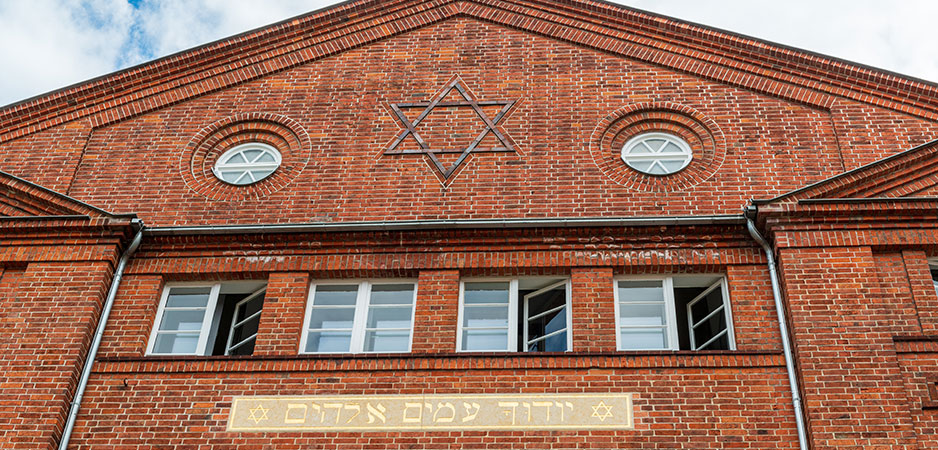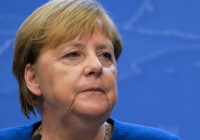In October 2019, a right-wing terrorist attack on a synagogue in Halle an der Saale led to two fatalities and reminded the German public of rising anti-Jewish violence and right-wing extremism. In the aftermath of the attack, Chancellor Angela Merkel called for more protection for Jewish people. Sadly, statements like these expose the fact that the political sphere in Germany has been underestimating the growing threat against Jewish life.
Anti-Semitism Continues to Be a Steady Feature Among Germany’s Radicals
Roman Yossel Remis was leading the prayers at the synagogue on the day of the attack and stated, “Today I experienced what it means to be Jewish, to be a Jew in 2019.” According to the journalist and author Richard Chaim Schneider, the attack in Halle showed that “Anti-Semitism has long since returned to the center of society. No, not arrived, because it never left: it simply crawled out of its holes again.”
Jewish Voters Want to Know
The Halle terrorist attack was the point of culmination and a gruesome expression of overriding societal developments concerning anti-Semitism in Germany. According to the latest report on anti-Semitism from Germany’s Federal Office for the Protection of the Constitution, “Anti-Jewish sentiment can be found in all extremist areas of Germany but is particularly prevalent in the right-wing spectrum.” Corresponding anti-Semitic attitudes also circulate among conspiracy theorists, in Islamism and, to a lesser extent, in left-wing extremism. Recent statistics undermine these worrying developments: Anti-Semitic violence doubled between 2017 and 2019, and 85% of the 73 anti-Semitic acts of violence in 2019 were motivated by right-wing extremism.
The return of anti-Semitism into the mainstream of German society highlights the question of where political parties stand in respect to its manifestations. The question also weighs heavily on those affected, namely Jewish people living in Germany. Linda Rachel Sabiers, a German author and columnist of Jewish descent, tried to describe the psychology of Jewish voters. According to Sabiers, many hinge their voting decisions on two key questions. Which party does the most against anti-Semitism and how to “vote Jewish.”
These were the questions she had to face up to herself: “If one wants to vote Jewish … one can perhaps weigh up which party actively opposes anti-Semitism and anti-Zionism. The search for a political home that offers both has made many Jews unhappy. … For years, I asked myself similar questions when voting, and at times — because of the anti-Semitism that flared … — I felt so cornered that between the ages of 18 and 34, I had no normal relationship to voting.” Following Sabiers’ opinion that this pattern of thought seems to be widespread among Jewish voters, a closer look at Germany’s political parties is of interest. Where do the main German parties stand in regard to anti-Semitism?
Alternative for Germany (AfD)
Despite leading representatives of the far-right Alternative for Germany (AfD) stressing the party’s pro-Israel and pro-Jewish stance, statements by members repeatedly trigger allegations of anti-Semitism. Even the existing faction, Jews in the AfD, which the AfD often refers to as evidence for the party’s pro-Jewish viewpoints, cannot gloss over anti-Semitic tendencies in the party ranks. The Central Council of Jews in Germany criticized the AfD’s pro-Jewish image by stating that the “AfD is a danger for Jewish life in Germany [and] a racist and anti-Semitic party.”
This warning comes against the backdrop of numerous problematic incidents of anti-Semitism within the AfD. One accusation was brought against Wolfgang Gedeon, an MP for the AfD in the state of Baden-Wuerttemberg, according to whom the view that the blame for the Second World War lies with the Nazis is “a version dictated by Zionism.”
Christian Democratic Union/Christian Social Union (CDU/CSU)
Learning the lessons from the Nazi past and in correspondence with the pro-Jewish fundamental consensus in postwar politics in Germany, anti-Semitic references ceased to play a part in the programmatic alignment of the center-right CDU/CSU. Nevertheless, the reproaches of anti-Semitism occurred regularly. Most prominently, Martin Hohmann, a former CDU MP, stated in 2003 that the claim of collective guilt against Germans during the Nazi period should also apply to Jewish people. The CDU/CSU subsequently excluded Hohmann from the fraction and party. Hohmann joined the AfD.
Liberal Democrats (FDP)
After the foundation of the FDP in the 1950s, national liberal tendencies were dominant. The party included people who had held high positions in the Nazi regime. From the late 1960s onward, the FDP departed from its national liberal imprint toward a center to center-right party.
But in 2002, the infamous Möllemann scandal awoke ghosts of the past. Jürgen Möllemann, a former MP in the national parliament, the Bundestag, was accused of stirring up anti-Semitic attitudes in society by claiming that the Israeli prime minister at the time, Ariel Sharon, had to bear the blame for the escalation of the Middle East conflict. He also branded German-Jewish television journalist, Michel Friedman, to be his political propagandist. The FDP refrained from taking decisive action against Möllemann. Since then, no incidents of equal gravity occurred.
The Greens
The center-left Green Party, which defines itself as a political force oriented toward human rights and the environment, publicly condemns anti-Semitism. Correspondingly, issues with anti-Semitism remained the exception. Still, debates about the Israeli-Palestinian conflict resulted in internal party disputes about potential anti-Semitic remarks and connotations. One major incident took place in 2002, when Jamal Karsli, an MP in the North Rhine-Westphalian state parliament, criticized the Israeli armed forces for applying Nazi methods in the conflict. In reaction to accusations of using anti-Semitic rhetoric, Karsli left the party and joined the FDP.
Die Linke (The Left)
A minority of The Left party harbors a pronounced hostility toward Israel that bubbles up regularly. Nevertheless, it is unclear whether anti-imperialism, anti-Semitism or a mixture of both lies at the forefront of this hostility. Anti-Israel positions in the left-wing of the party usually aim at Israeli state policies toward Palestine. By often alluding to a “David versus Goliath” narrative, Israel supposedly acts as an imperial, ruthless power.
Among several problematic intraparty incidents was the invitation of two controversial publicists and Israel critics, Max Blumenthal and David Sheen, to a discussion on the topic of the Israeli-Palestinian conflict by two MPs from The Left. Gregor Gysi, former party whip in the Bundestag, disapproved of the invitation and decided to call off the meeting.
Social Democratic Party (SPD)
The center-left SPD has been steadfast in its committed stand against anti-Semitism. André Levi Israel Ufferfilge, a researcher in Jewish Studies at Münster University, wrote in 2009: “In my opinion, the SPD seems to have a good standing with many Jews. … It is very welcome that the SPD has a working group for Jewish Social Democrats and that Judaism is considered part of the roots of social democracy in the SPD’s latest party manifesto.”
Although anti-Semitic incidents are just as rare as with the Greens, the party has not been untouched by accusations. In 2018, Ulrich Mäurer, an SPD senator from Bremen, falsely claimed that the Israeli army is “executing dozens of Palestinians at the border fence.” In response to fierce criticism from outside and within the party, Mäurer apologized for his “unfortunate choice of words.”
Germany’s Parties Need to Act on Anti-Semitism
All parties in the German Bundestag show sensitivity toward the issue of anti-Semitism and are quick in denouncing it. Still, some, particularly the AfD, either display more frequent or singular prominent allegations of anti-Semitism, like the Möllemann scandal in the FDP, that persist in the public memory. Thanks to fewer major allegations, Jewish voters lean toward parties closer to the center, like the SPD and the Greens.
Nevertheless, none of the parties have been unblemished by accusations of anti-Israel or anti-Semitic rhetoric. These controversial incidents often give rise to exhaustive debates among the German public about the thin line between justifiable criticism of Israeli politics and anti-Semitism. Due to the public attention and the recent increase in anti-Semitic violence, these intra-party incidents weigh heavily on the minds of Jewish people and voters, and hence deserve scrutiny.
Jewish voters in Germany seem to make their voting decision dependent on the parties’ attitudes toward anti-Semitism. That highlights their vulnerability in society, which originates in Germany’s history and the persecution of Jews during the Nazi period. This vulnerability has reemerged due to soaring anti-Semitic attitudes in Germany. The growing concerns of Jewish people is a call to action for Germany’s political parties. Evaluating their own and other parties’ activities against anti-Semitism more thoroughly should be a small building block of a bigger picture, namely protecting Jewish life in Germany.
The views expressed in this article are the author’s own and do not necessarily reflect Fair Observer’s editorial policy.
Support Fair Observer
We rely on your support for our independence, diversity and quality.
For more than 10 years, Fair Observer has been free, fair and independent. No billionaire owns us, no advertisers control us. We are a reader-supported nonprofit. Unlike many other publications, we keep our content free for readers regardless of where they live or whether they can afford to pay. We have no paywalls and no ads.
In the post-truth era of fake news, echo chambers and filter bubbles, we publish a plurality of perspectives from around the world. Anyone can publish with us, but everyone goes through a rigorous editorial process. So, you get fact-checked, well-reasoned content instead of noise.
We publish 2,500+ voices from 90+ countries. We also conduct education and training programs
on subjects ranging from digital media and journalism to writing and critical thinking. This
doesn’t come cheap. Servers, editors, trainers and web developers cost
money.
Please consider supporting us on a regular basis as a recurring donor or a
sustaining member.
Will you support FO’s journalism?
We rely on your support for our independence, diversity and quality.






